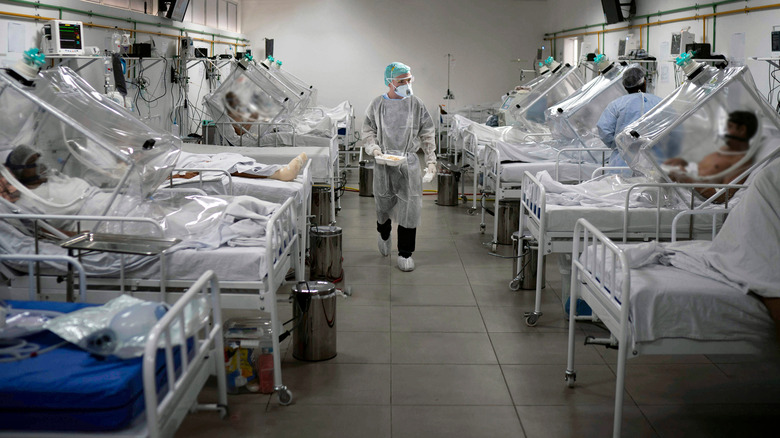The Strange Effects That Having COVID-19 May Have On Your Eyes
By now, we are all aware that even a mild case of COVID-19 can have many strange and unexpected side effects. From "COVID tongue" to hair loss to menstrual problems, it is almost like there is no bodily part or function that COVID-19 does not interfere with. For this reason, it should really be no surprise that having COVID-19 can affect your eyes. One study published in the journal BMJ Open Ophthalmology found that 16% of surveyed COVID-19 patients reported sore eyes. Most of these patients reported the symptom lasted for less than two weeks.
Unsurprisingly, COVID-19 long-haulers are more likely to experience eye symptoms. According to a survey conducted by Survivor Corps, nearly one-third of long-haulers reported pink or red eyes, and nearly half reported eye pain and pressure. People who suffer severe COVID-19 are also more likely to report eye difficulties; one study in France found that some patients with severe COVID-19 exhibited serious abnormalities in the back of their eyes (per Health Day).
Not much is known about eye abnormalities caused by COVID-19
While it has been known since early in the pandemic that COVID-19 can result in pink eye, it is unclear just how often. Results from studies range from less than 1% to nearly one-third of patients (per All About Vision).
Even less is known about the major eye abnormalities discovered in some patients with severe COVID-19. In an analysis of 129 COVID-19 patients who underwent MRI scans, 7% were found to have nodules (swellings) in the back of their eyes. All but one of these patients had received care in the ICU for COVID-19, and all but two had been intubated or spent time in the prone position. According to the researcher, the nodules may have been caused by insufficient drainage of the veins around the eyes because the patients had been spending so much time in the prone position. Another possibility raised by Dr. Claudia F.E. Kirsch is that the virus entering the bloodstream may have blocked blood vessels and sparked an inflammatory response which affected the eyes (per Healthline).
According to Kirsch, the primary goal in the ICU is to prevent the patients from dying, so not much attention is paid to eye nodules. However, these nodules are dangerous because they may result in blindness if not given proper treatment. Kirsch notes that "prevention would be the ideal so that patients don't contract the disease at all." Now that vaccines are widespread and readily available, getting the vaccine is the best step we can take to prevent these sorts of side effects from happening to us.


